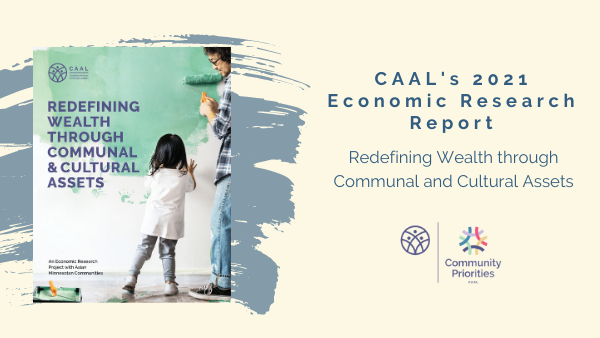
Download the Report
What is Redefining Wealth through Communal and Cultural Assets?
Since our founding in 2013, the Coalition of Asian American Leaders (CAAL) has led a critical discourse on data, explicitly advocating for disaggregated (broken down) data to dispel myths and create deeper understandings of the lived experiences and nuances that make data meaningful and useful for problem solving. In 2015 we broke down data in Path Forwards in Education and Economics and paired it with stories to reveal the disparities among Asian Minnesotans. After publishing Invisibility Perpetuated: The Complex Economics of Asian Minnesotans in 2018, we quickly decided that more effort was needed to move economic work forward that would more intentionally include Asian Minnesotans. What was missing then and now is a deeper understanding of what wealth means to Asian Minnesotans–and a deeper dive into how the community uses financial resources–and how cultural and community factors impact the economic well-being of the community. We looked to see if any research had been done in Minnesota given the unique makeup of the Asian population here. We discovered that there has never been a qualitative economic research project conducted for this population so we worked together with our network to create an economic report on Asian Minnesotans titled: Redefining Wealth through Communal and Cultural Assets.
- This report combines the quantitative and qualitative data to lift up what Asian Minnesotans want to share about themselves and their community when it comes to economic well-being. The findings tell us that while Asian Minnesotans as a whole continue to be complex and idiosyncratic, key factors and themes are important to the population as a whole. For example, the population’s strengths in sharing its financial resources through practices such as familial money sharing are crucial when service providers and decision makers consider how best to address poverty and wealth building.
- In addition, this research shows that wealth is defined in many ways and goes beyond the accumulation of money and material possessions. Elders talk about having substantial cultural and social capital that transcends and supports intergenerational transference of knowledge and relationships; this must be strengthened in diaspora communities globally. And yet, existing rules, infrastructure, and programs often don’t acknowledge or nurture these value-based practices.
Findings from our research elevate the different resource-sharing practices among Asian Minnesotans. These include, but are not limited to:
- providing formal care (elder care, child care, etc.)
- passing on inheritance to other family members ( in the form of property and land, money, social networks and social mobility, credit, cultural or familial knowledge and capital, etc.)
- participating in remittances (both in the form of money and gifts)
- pooling financial resources (to establish lending circles, build credit for others, support others with spending needs, etc.)
- living in multigenerational households
- providing and/or sharing housing
2021 Economic Research Report Media Coverage
The Minnesota Daily: “Report provides disaggregated data on economic well-being of Asian Minnesotans” (January 26, 2021)
Minnesota Women’s Press: “CAAL Releases Pioneering Economic Report on Asian Minnesotans” (January 26, 2021)
AAOP Blog: “Virtual Event Recap: CAAL MN’s ‘Redefining Wealth Through Communal Assets’ Official Research Launch” (January 22, 2021)
2021 Economic Research Report Official Launch
2021 Economic Research Report Soft Launch
“I really appreciate the report, I think it should be read by every policymaker interested in understanding the [Asian Minnesotan] community and, most of all, acting with cultural intelligence and investing in this important community. So thanks for this opportunity to share some insights. ”
– Bruce P. Corrie, Ph.D., Twin Cities-based economist, business expert, cultural entrepreneur, and longtime member of the Concordia St. Paul faculty
“I see a lot of possibilities…within philanthropy and I really hope it enlightens funders’ thinking around this topic in particular and how it can inform their grant making.”
– Jen Racho, Program Officer, Northwest Area Foundation
“This report brings to light, not only the data piece, but the real people behind the story.”
– Bao Vang, President and CEO, Hmong American Partnership